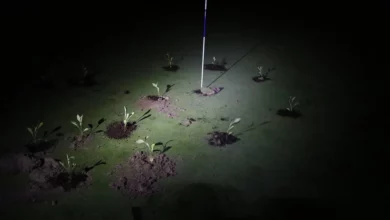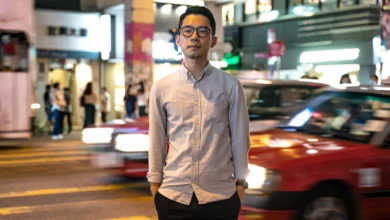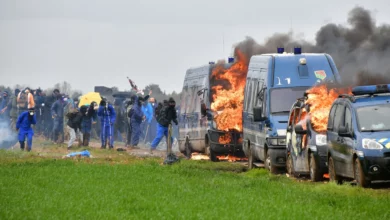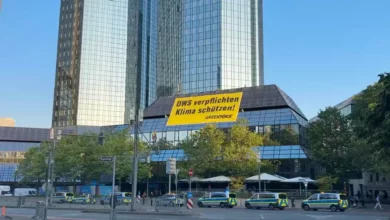In 2007, Sinai activist Mosaad Abu Fajr was imprisoned for allegedly organizing a demonstration against a housing demolition in Salah Eddin, on Egypt’s border with Gaza. A vocal promoter of Bedouin rights, Abu Fajr had also just founded the Wedna N’eesh (We Want to Live) campaign. In spite of court rulings that he be freed, Abu Fajr remained in prison for 30 months. Upon his eventual release, this month, he spoke to Al-Masry Al-Youm in Arish, North Sinai about his experience and his hopes for Sinai.
Al-Masry Al-Youm: Did you experience any sort of persecution in jail?
Mosaad Abu Fajr: My experience as a detainee is infinite, it is like fate which one has to adjust himself to. The conditions in Egyptian prisons are unendurable. The way inmates are received is cruel. I was not exposed to sunlight until my family came to visit me. We remained confined in our cells for 20 days, and were only allowed out within the one meter that separates the cells. The atmosphere there is filled with the odors of death and silence, and empty of any signs of hope.
Worst of all is the process of searching the prisons. At such times, we are treated as objects or animals rather than humans. Officers goad us with their sticks, forcing us to put our hands on our heads as they drive us out of our cells. Then we have to gather all our belongings into one pile and spend a whole day searching for them. These conditions do not suit Egypt’s name and history.
As for me, I was put in a cell with inmates sentenced to life. Imagine a cell originally devoted to six inmates but containing more than 60, with prisoners sleeping in shifts.
I am not eager to recall more of this grim period, but I appreciate the roles played by all of those who helped me get out. I was starting to lose hope that the government would change its stance, not toward me personally, but toward the causes I have been championing.
Al-Masry: What’s your vision for Sinai in the future?
Abu Fajr: I doubt the regime’s intention to continue the reform or work seriously to better the situation in Sinai. Personally, I don’t tend to conflicts or call for them. We have a role in Sinai’s improvement. We will continue our amicable contacts with authorities to get our rights, within our faith of being Egyptians. Egyptians were the main help in getting me released, and this is what we depend on in order to settle future situations. Sinai is part of an Egyptian renaissance project that we have been witnessing for years. We can’t lose hope. Everything is possible and we’re not separated from what happens globally. On the local level, everything indicates that the future will be different.
Al-Masry: There are voices that call for the Sinai issue to not be controlled by the Ministry of Interior but by another sovereign authority, claiming it would be an optimum solution in Sinai. What do you think?
Abu Fajr: (Interrupting.) I disagree. It’s unreasonable to turn to the militarization of administration. I am a civil state preacher. It’s true that there’s a pressing need to stop the Ministry of Interior’s acts within the law and judiciary, though it’s hard for this system (law and judiciary) to do this now. I see no reason that other authorities cannot take on its duty during such a period of intense violations, which need to be reassessed, without abandoning the idea of a true civil state and dealing with the Sinai case as you would any other case that needs to be changed and can be easily reformed. Sentencing people in absentia doesn’t mean that they are criminals. Most provisions were decreed against those who smuggled goods to blockaded Gaza through the tunnels. I can’t ask any Bedouin for amicable contacts in order to open the Rafah border, because he has only direct contacts with Palestinians to supply them with daily goods. They are wrong, but they are not criminals. We have to tell them not to make mistakes that the government would detain them for. We have to start development projects that can change the status quo and get us out of this circle of violence.
Al-Masry: What about your role as an intellectual in an unstable society?
Abu Fajr: My role focuses on a project that includes negotiations. We, along with tribes and sheikhs, adopt a policy of “Give, take, but don’t clash.” We will communicate with people via direct and legislative channels so both the authorities and the people can be motivated through their common partnership in the country’s future. I’m sure that the whole world is connected to progress in Egypt, which has a great effect in world history and can continue its role in supporting world peace.
Al-Masry: What about your literary plans?
Abu Fajr: I will soon publish my new novel, Kamaen Mutaharreka(Moving Traps). In this book I tackle the conditions in Sinai, my experience in prison, the role of Bedouins in civilization, and the Sinai citizen’s being trapped between nuclear reactors on one hand, and the questioning of their loyalty on the other. In this novel, I am not intending to be skeptical of the nationalism of certain individuals, since my relationship with the state is far more important than songs and romances. This relationship is like a social pact under which no one can accuse the other of treason, for such a charge is only determined by the law.
Translated from the Arabic Edition.




